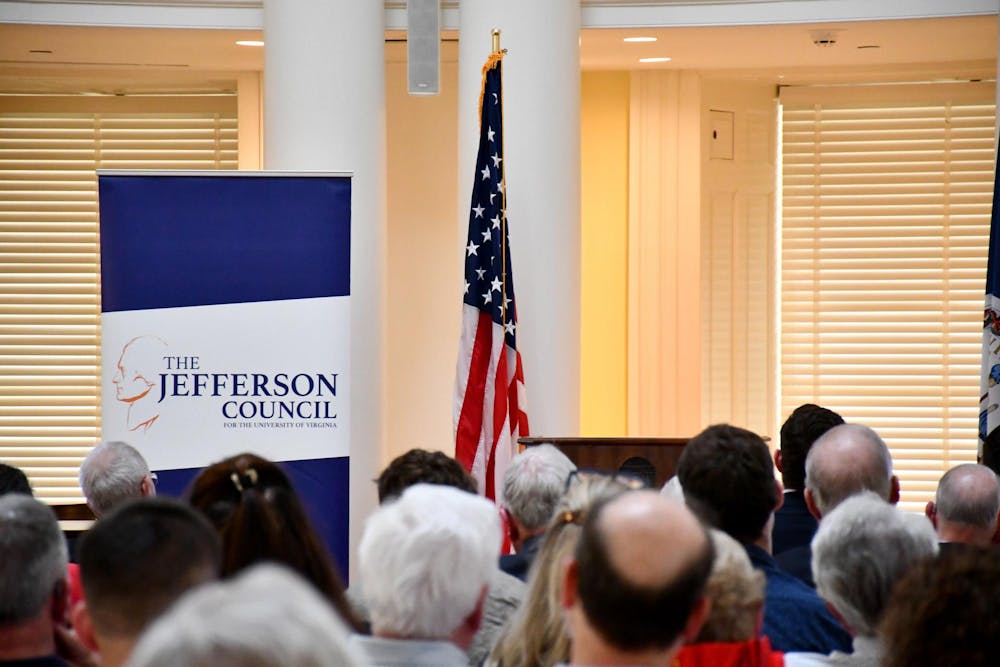The Jefferson Council’s recent letter regarding discontent with the Board of Visitors raises many well-founded arguments against those who might believe the Board’s presidential search must be more inclusive. The fact of the matter is this — Virginia law prescribes that the Board alone is responsible for choosing a new president. Debates about community inclusion are arguments about normative policy choices, rather than objective legal arguments. While one can certainly fault the Board for its policy decisions, it is undisputed that Virginia law does not recognize community involvement in the process of choosing a president. Yet, in their effort to save the Board from political disparagement, the Jefferson Council fails to consider another, more obvious argument against the Board’s actions— the fact that it does not meet the legal requirement to be considered a governing board at all.
The law commands that the Board will consist of 17 total members, 12 of whom are Virginia residents and 12 of whom are University alumni. Currently, the Board has 12 total members, only nine of whom are alumni or residents of the Commonwealth. Such a glaring violation of the law should cause alarm in anyone who wants to ensure the Board’s actions are deemed legitimate, especially given that the search for a new president and the appointment of an interim president were both initiated by a legally deficient group. The legal dubiousness of these actions risks destabilizing the University.
This observation is noticeably absent in the Jefferson Council’s letter. Indeed, with a lack of lawful composition, any and all actions the Board takes are called into question. While the Jefferson Council is right that this presidential search committee is the most inclusive in recent memory, that claim is blighted by the fact that the decision to form the committee in the first place was illegitimate. Other actions, such as making a deal with the Department of Justice, are also called into question. The agreement itself is a catastrophe for the University, and the fact that it was signed by a legally dubious appointee is all the more disrespectful to the University community.
This composition requirement is not a mere legal nicety. Having proper Virginia and University representation on the Board ensures that it acts in the interest of those the University should be most dedicated to, namely, the taxpayers of Virginia and the University community it serves daily. This representation is all the more important as the Board considers decisions that will have long-lasting impacts on both the University and the Commonwealth, including the recent agreement with the DOJ, the search for a provost and ultimately choosing a new University president. As advocates of lawful procedure, the Jefferson Council should join community members in condemning any action taken by this current, statutorily wanting Board.
The Jefferson Council’s letter does offer some wise responses to those who might potentially advocate for political games to deal with the Board. For instance, the Jefferson Council lambastes Virginia Senate Majority Leader Scott Surovell's argument that the Board should refrain from choosing a new president in the hopes that a new governor will appoint a Democratic Board majority. While Surovell reaches the right conclusion on how the Board should move forward, he does so via the wrong argument. Officials are elected for fixed terms and are entitled to execute their powers for the entire term, regardless of election results in their lame duck period. Surovell’s argument should raise alarm bells for those who deplore Mitch McConnell-esque arguments for waiting until the next election to appoint government officials.
Furthermore, the Jefferson Council is right to point out that any criticism of the Board based on mere political composition is hypocritical. Former University Presidents John Casteen, Teresa Sullivan and Jim Ryan were all picked by either a majority or completely Democrat-appointed Board. In fact, the very nature of the University as a public institution means that, inevitably, its governing body will be appointed by political actors. It would be shortsighted to criticize the Board even in part on the fact that its members were appointed by a governor of one party or another without considering other factors, like its unlawful composition.
Unfortunately, the problem of the Board’s unlawful composition has been made all the worse by Gov. Glenn Youngkin, who has vowed to stop reporting his political appointments to the Virginia General Assembly for their consideration. Should he purport to place people on the Board without submitting them for consideration, they too will be considered illegitimate. This cycle of political partisanship will ensure the Board remains legally insufficient for the foreseeable future. At a time when the University faces momentous decisions about its future, Virginia’s leaders must do all they can to ensure the bodies making those decisions are legally adequate.
Critics of the current University administration should consider the Jefferson Council’s caution against mere political arguments. Ultimately, these types of issues can only be solved at the ballot box on Tuesday. Yet, it would behoove the Jefferson Council to ponder the merits of an argument against the Board grounded in its legal illegitimacy. This critique need not turn on any political affiliation, but rather one’s affiliation to the rule of law — a rule that faculty, students and alumni can surely support. The only logical action mandated by this devotion is to implore the Board to hold off on acting until it can satisfactorily meet its legal requirements, and all who pledge themselves to the betterment and legitimacy of the University should heed this calling.
Michael King is a senior associate opinion editor who writes about politics for The Cavalier Daily. He can be reached at opinion@cavalierdaily.com.
The opinions expressed in this column are not necessarily those of The Cavalier Daily. Columns represent the views of the authors alone.







